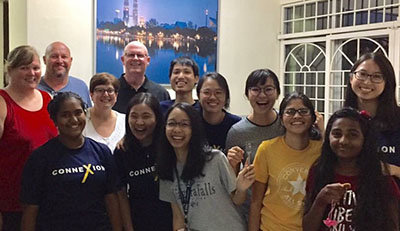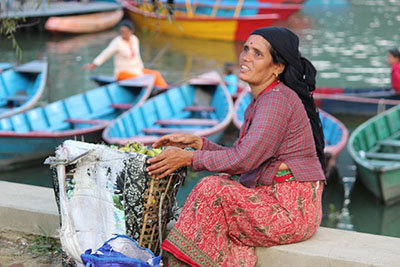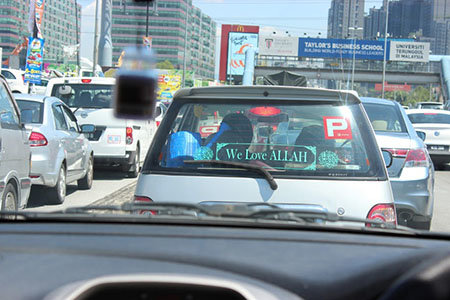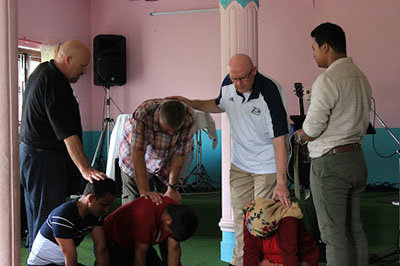By Morgan D. Kerr
MACON — Over the last 25 years, I have had the honor and pleasure of serving as a pastor in the Southern Baptist Convention. I have pastored six churches in three different states, three of which were in the state of Georgia. During this time, I have led these congregations to give generously to the Lottie Moon Christmas Offering. In my estimation, the Bible and missions have always been the focal points and thrust of the Southern Baptist Convention since its inception in 1845. Today, Southern Baptist churches throughout the world continue that legacy of faithfully supporting missions by giving to the Cooperative Program and to the Lottie Moon Christmas Offering (LMCO).
 John and Cynthia Waters, along with Morgan and Ladette Kerr, visit with university students in Kuala Lumpur during a Bible study. MORGAN KERR/Special
John and Cynthia Waters, along with Morgan and Ladette Kerr, visit with university students in Kuala Lumpur during a Bible study. MORGAN KERR/SpecialIn 2015, I began serving as a trustee for the International Mission Board (IMB). Truthfully, my first year as a trustee was a difficult one because we faced the need for significant changes to be implemented if we were going to maintain long-term financial health. Under the capable leadership of the IMB’s president, David Platt, the agency saw its first balanced budget in over a decade. Additionally, as the financial need was communicated to our churches, Southern Baptists rose to the occasion and gave generously to LMCO.
Over the last two years the leaders of the IMB have developed and communicated to the SBC a strategy that is currently being implemented for reaching the world for Christ. This strategy is to share the Gospel with unreached people groups and the most densely populated metropolitan areas.
This focus encourages the limitless resources within the church to be used to engage the world and reach those without the Gospel by funding missionaries who endeavor to work alongside nationals on the field. This strategy permits the local church to be full partners in the missional endeavor of reaching the nations.
 A Nepali woman sits at a festival in Pokhara. MORGAN KERR/Special
A Nepali woman sits at a festival in Pokhara. MORGAN KERR/SpecialRecently, I had an experience that enhanced my view of our mission and the value of giving to the LMCO. On Sept. 24, my wife Ladette and I joined another trustee, Pastor John Waters of First Baptist Statesboro and his wife Cynthia, as we spent almost three weeks in Nepal and Kuala Lumpur, Malaysia. Trustees of the IMB are encouraged to go to the field to observe, encourage, and listen to our staff as we were privileged to do. After the experience, I walked away with two words that God burned upon my heart in regards to our staff on the field: investment and sacrifice.
In light of the most difficult place to reach in the world, our team went to Kathmandu and Pokhara, Nepal for the first part of our journey. Kathmandu is a city of approximately three million people whereas Pokhara has a population of roughly 500,000. Although we were able to observe the breathtaking vistas and beautiful people, I was nonetheless heartbroken over the degree of lostness that saturated both these cities. Unlike many places in the world, Nepal is a place where people go to find themselves spiritually. Along the way, we met a New Zealander, a Jew, and several Americans who were “trying to find answers to spiritual problems.”
Additionally, we witnessed thousands of nationals who were attempting to balance the bad in their lives with the good through prayers, rituals, and sacrifices, only to walk away without hope. As we spoke, listened, and interacted with our staff on the field, it became clear that in order for effective long-term ministry to be successful, there had to be a strategy implemented to justify our staff’s presence on the field in regard to the culture. Simultaneously, there must be a strengthening of the indigenous leadership to assume positions of authority within the Bible studies and churches of these two respective areas.
One such team leading this endeavor is the Bagbys (names changed for security purposes). This family that we had the privilege of meeting, is one of the highlighted couples for this year’s LMCO mentioned in the current copy of On Mission. The Bagbys demonstrated how effective teams possessed a desire to develop long-term relationships versus teams that came once and were never seen again. Also, effective teams and ministry take into account the culture in which they are set, thereby allowing for opportunities to arise to share the Gospel in non-threatening ways.
 A bumper sticker states “We Love Allah” in Kuala Lumpur. MORGAN KERR/Special[/caption]
A bumper sticker states “We Love Allah” in Kuala Lumpur. MORGAN KERR/Special[/caption] It saddened my heart when I heard about a village that had been targeted by a thoughtless and shortsighted mission team, only to have the community vote never to allow the Gospel to be preached again. The workers we met in Nepal were intentional and deliberate in the strategy being implemented. Furthermore, they were excited about the possibilities of witnessing what God would do through the church as Christ empowers limitless resources to go onto the fields “white unto harvest.”
After a week in Nepal, we flew more than 2,000 miles to the modern city of Kuala Lumpur (KL), Malaysia. Imagine, if you will, almost the entire population of the state of Georgia being placed within the metropolitan area of Atlanta.
That is a great picture of what this center of commerce, technology, education, and religion has become in the span of less than a century. With almost nine million people and over one million university students, this predominately Muslim country abounds with opportunity on every corner to reach out to the nations as they come to this global city. However, care must again be taken and strategy must be implemented after you understand that the indigenous population is born into Muslim families and it is illegal for them to be proselytized.
 Georgia pastors John Waters and Morgan Kerr pray over Nepali believers. MORGAN KERR/Special
Georgia pastors John Waters and Morgan Kerr pray over Nepali believers. MORGAN KERR/SpecialBecause of this reality, our IMB staff has implemented a global city initiative to encompass the mammoth job of reaching this enormous city. The good news is that part of the strategy is the folding in of teams from local churches just like yours who are looking for an opportunity to make an impact for eternity.
As I returned from this remarkable trip, I was a changed person. I saw firsthand where our LMCO gifts go, and I was not disappointed. The sacrifices our missionaries and staff make on a daily basis are awe-inspiring. But, I want to encourage all of our churches to consider joining those on the field for an end-time harvest. For each dollar you invest in the LMCO or Cooperative Program, you are investing into not just a temporal exercise, but an eternal enterprise.
We are the church, and we are the generation that can make the difference if only we are willing to sacrificially give and go.